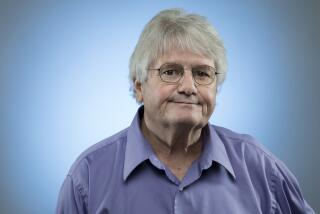Robert Shogan dies at 83; Times’ Washington political correspondent
- Share via
Robert Shogan, a former Los Angeles Times national political correspondent who covered Washington for more than 30 years and wrote more than a dozen books on topics as diverse as the New Deal, violence in West Virginia’s coal fields and the nature of presidential leadership, died Wednesday at a hospital in Washington, D.C. He was 83.
The cause was pneumonia, family members said.
Shogan was seen by his colleagues as a consummate reporter who managed to secure the trust of Washington insiders without becoming one himself.
“He spoke the language of politicians and political operatives,” said Richard T. Cooper, a retired Times reporter who also covered Washington. “He had this down-on-the-field knowledge of politicians, and what they were doing, and why.”
Before joining The Times in 1973, Shogan reported from Washington for Newsweek.
As plain-spoken about the press as he was about politicians, Shogan wrote a 2001 critique of campaign coverage called “Bad News: Where the Press Goes Wrong in the Making of the President.” Sam Donaldson, the veteran ABC reporter, called it “a wake-up call for journalists everywhere.”
Shogan once countered a quip from a prominent columnist who said “there’s only one way for a reporter to look at a politician, and that’s down.”
“Well, I’ve never felt quite that superior to anybody,” he told Brian Lamb of C-SPAN, “but I have felt there’s only one way for a reporter to look at or think of a politician, and that’s from a distance. Any reporter who thinks that a politician is his friend is kind of foolish.”
With a thick New York accent and a self-deprecating wit, Shogan asked hardball questions.
“He definitely didn’t try to be Mr. Nice Guy,” said Don Frederick, a former Times reporter who roamed Iowa with Shogan during the 1996 presidential campaign.
One night at a bar in Des Moines, Republican consultant Mike Murphy spotted Shogan and dubbed him “the Columbo of American political journalism,” Frederick recalled.
“I’ve always thought that so apt,” said Frederick, who is now an editor with Bloomberg News. “He had this shambling quality and this discursive style — but his questions were always spot-on.”
Born in New York on Sept. 12, 1930, Shogan was raised behind his parents’ dry-cleaning store a few blocks from the beach in Far Rockaway. He wanted to be a reporter since elementary school and studied journalism at Syracuse University, graduating in 1951. He served in the Army from 1952 to 1954.
Signing on with the Detroit Free Press in 1956, he worked beside veteran reporters who “acted like they had all covered the Leopold-Loeb case and the Chicago fire,” he later recalled.
“They said, ‘Well, kid, how long have you been in the business?’ ”
“I said, ‘All my life,’ because I thought that was the safest answer to make.”
In 1965, Shogan left journalism for two years, evaluating Peace Corps programs throughout the world.
His books included “None of the Above: Why Presidents Fail and What Can Be Done About It” (1982); “The Riddle of Power: Presidential Leadership From Truman to Bush” (1991); “The Battle of Blair Mountain: The Story of America’s Largest Labor Uprising” (2004); and “Harry Truman and the Struggle for Racial Justice,” which was published earlier this year.
Shogan, who retired from The Times in 1999, was preceded in death by his wife of 46 years, Ellen Shogan. He is survived by daughters Cindy, director of the Alaska Wilderness League, and Amy, an immigration attorney; his brother, Richard; three grandchildren and a great-grandson.
More to Read
Start your day right
Sign up for Essential California for the L.A. Times biggest news, features and recommendations in your inbox six days a week.
You may occasionally receive promotional content from the Los Angeles Times.







